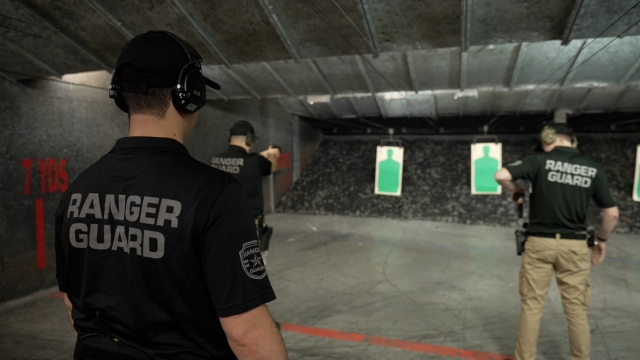In moments of crisis or concern, whether it’s at a store or a concert, security guards may be the ones people turn to for help.
The number of security guards in the U.S. is rising at a time when the number of police officers across the country is on the decline, according to the Bureau of Labor Statistics.
Private security companies are reporting a boost in business, like Ranger Guard, based in Houston. The company employs 400 security guards in Texas. It also operates in Florida and Nevada.
The majority of the company's business is providing unarmed security, but people like Meir Marcus train those who want to be armed security guards.
"The majority of it is classroom, then you have a hands-on course that covers combative, handcuffing, pepper spray, baton and firearms. And you'll do those things hands-on as part of your training," Marcus says.
Many of the guards he trains will patrol parking lots, construction sites and even schools — like a private one in Houston that caters to the Jewish community, he showed Scripps News.
Texas lawmakers areproposing a billthat would require all schools in the state to have at least one armed security guard on campus.
"A lot of that comes down to response time; you can't beat the response time of someone who is there on site already," Marcus says.
Ranger Guard's founder, David Catran, says the days of people perceiving security guards as just "mall cops," in his words, are changing.
He says demand for private security is growing with concerns about crime in many of the cities they work in.
SEE MORE: How Americans feel about crime can have a big impact on politics
Last year, property crimes increased in many large cities, according to a report by the Council on Criminal Justice.
Crimes like car thefts and break-ins are solved only 13% of the time, according to Pew Research.
Catran says businesses in recent years have become willing to pay him more for someone to stand guard.
"If we go back, I would say five years ago, where police would command, let's say, $45 an hour and a security guard company would come in at $19-$20 an hour, today I can say that we're even," Catran says.
While more businesses may be turning to private security with many police departments stretched thin, one expert says it's important to understand the difference between private security and private police.
Robert McCrie teaches at the John Jay School of Criminal Justice in New York and has studied private security since the 1970s.
"The industry doesn't like that term, 'private police,' because they really aren't police," McCrie says. "Private security officers are there to deter, to detect, to respond, but not to put their lives at risk if something untoward is occurring."
The qualifications to be a security guard vary from state to state. Along with firearms training, in Texas, security guards also need to pass a background check.
"Every state is different, so it's a state-run industry, and so even to the local level sometimes, there are really differences," says Steve Amitay of the National Association of Security Companies.
Amitay travels the country in support of states adding training requirements for security guards.
SEE MORE: From crime victim to advocate, a life of purpose
He says 28 states require specific hours of training for a security guard to carry a gun. Maryland's governor signed a bill that will make his state the 29th in 2024.
In states that do not regulate security guard training at the state level, it's up to cities and counties to put their own qualifications in place. There is no national standard, but he says more places have been putting in training requirements in recent years.
In 2022, a law went into effect in Tennessee that required security guards to go through de-escalation training as well as learn CPR and first aid. The law is called Dallas' Law, named after a man who died after being restrained by security guards in Nashville in 2021.
With more businesses turning to private security, Amitay says it's important people understand the role they play and the responsibilities they have.
"I do worry that people are going to think this private security officer — he's wearing a uniform, he's armed — but he's not a police officer, so tempering that expectation is very important," Amitay says.
Amitay says it's important people remember the job of many security guards is to deter crime, which is why Jared Dubin's company still has security guards patrol the properties it owns and manages.
"It's not going to stop everything but if you see a car that's marked with lights and it's driving around constantly present, that criminal looking to score that quick couple hundred bucks from a catalytic converter is going to think twice before stepping on the property," Dubin says.
Dubin says even with high-tech tools and camera systems on the market that can observe crime, there is power in the human touch, and people like those Marcus trains.
Trending stories at Scrippsnews.com




